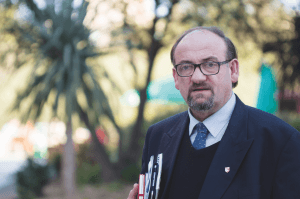Tourism has long been an integral part of the Maltese economy. But a big dose of change is sorely needed if we’re to keep the money coming in without selling our souls in the process. Julian Christopher Zarb explains why.
What does tourism mean to you? To many, the word conjures images of idyllic beaches, fascinating historical excursions, or even a long overdue opportunity for retail therapy. But what does tourism mean to the communities being visited? Are we aware of the effects it has on them?
For the past six years, I (Julian Christopher Zarb) have been developing a workable and effective process for implementing a tourism policy for the Maltese Islands. The biggest issues that could delay, or even scuttle, such a project are: commitment, short-termism, and the commoditisation of the tourism experience.
 Tourism: The Briefest of Histories
Tourism: The Briefest of Histories
Tourism has developed greatly over the past few centuries. It is no longer an activity reserved to the elite. In 2015, traveller totals reached 1,186 million globally, a rise of 52 million from the previous year. Of those, more than half (53%) travelled for leisure purposes. This comes despite the threats of terrorism, natural cataclysms, and economic recession. Closer to home, the kind of tourist visiting our island has changed. Between 1925 and 1939 the wintertime tourist dominated Malta, seeking discovery and adventure. The post-war boom years, between 1958 and 1987, saw leisure markets maximising on tourist arrivals. Now, the Maltese Islands find themselves in the modern period where tourists are more prolific during summer months and the culture of leisure packages is deeply entrenched.
Today, tourism success is pegged against absolute numbers, a kind of short-term analysis that has many shortcomings. Principal stakeholders––politicians and business people––need practically instant, tangible returns on investment, a modus operandi that is simply unsustainable.
Malta and Gozo’s population density is one of the highest in Europe. In summer, tourism can become invasive to the local lifestyle and character. Major examples are areas like Sliema and Bugibba. The ‘carrot’ many businesspersons and politicians dangle in front of the communities––the employment opportunities––is not quite as fresh and enticing as it once was given that many of the jobs in hospitality and tourism are being taken up by non-residents. So, given these challenges, how can we make tourism work for the Maltese Islands?
Collaboration between stakeholders is key to answer this question.
The local community, politicians, and businesspeople need to work together, pooling their individual expertise and resources to foster this sense of responsibility in our tourism industry.
And this cannot be a reactive strategy, a result of market forces or legal requirements. It has to be a move that is understood to be the way Malta avoids that commoditisation and development which reduces the very character and uniqueness which attracted the tourist at the outset.
A Qualitative Concept for Tourism
The business community and the local authorities have at times strong-armed the local community when taking decisions in the tourism industry. This is detrimental for many reasons. The most obvious is that the community includes those people who truly create that diverse experience for the visitor through hospitality and service.
Hospitality and service are two of the most basic qualitative factors in the tourism industry. Today, the terms are used rather mechanically instead of referring to genuine human interaction. Policymakers who are serious about implementing sustainable tourism have to place those elements in focus. One practical example of sustainable tourism is community-based tourism. This form of tourism could work worldwide for all stakeholders including local communities and was developed over thirty years ago as a method for making the activity more responsible and beneficial to the host community.
Community-based tourism is challenging to implement. Financial resources are a common barrier. However, human resources need to be bolstered as well.
The solution here is to build strong synergies based on trust and honesty between all stakeholders, and to maximise those skills which each group or organisation can provide the project or initiative with.
The short-term strategic approach discussed previously brings with it the second problem––stakeholder fatigue. Any project or initiative that is undertaken needs to happen within a specific timeframe and produce an outcome with little flexibility, leaving stakeholders’ hands tied when new, potentially unproven opportunities come along.
Marketing is the final issue. Cutting into the market share of any established tourism industry means looking for that potential client who wants to be at a destination rather than the one who happens to be there. The challenge here is to persuade practitioners that new and diverse experiences can offer a broader perspective of a destination and reduce the uncertainties of the mainstream markets. This also, however, feeds into the first issue of financial resources. Malta would need to rebrand to attract a different kind of tourist—not cheap.
Looking to communities
The research project to develop community-based tours, which is being spearheaded by the Institute for Travel, Tourism, and Culture, and The Malta Tourism Society at the University of Malta, will provide the basis for developing a strategy or policy document on the Introduction of Community-Based Tourism for the Maltese Islands and may even serve as a template for other destinations.
The project has been developed in five stages. We started with the development of itineraries and maps together with local councils, local businesses, and the local community. These itineraries list those places of interest in any locality (town or village) that have socio-cultural value as well as a living history. These itineraries serve as a guide for visitors who would like to learn more about the locality, but are also a vehicle through which the local community can develop a sense of awareness and belonging, a vital element in the creation of a sustainable and authentic visitor experience.
The next stage consists of the marketing for the itineraries and maps. Online and social media are key, as well as up-to-date, informative, and attractive printed material. This stage also involves meetings with the industry stakeholders, including incoming travel agents and hoteliers. It is vital that a close, collaborative, and continuous relationship is established between all the stakeholders at this point.
The third stage involves the development of community-based tours, activities where the visitor has the opportunity to meet the locals rather than simply looking at the places they inhabit. This whole process will mirror the development of the itineraries and maps, turning it into a collaborative effort that meets the needs of all involved.
At the next stage, the community-based tour will undergo a marketing process that is unique. Rather than looking at promoting this tour for groups, it should offer an opportunity for one-to-one personalised hospitality and service. Besides an online presence, there also needs to be hospitality meetings with potential visitors who prefer this more individual experience.
The final stage consists of a continuous study to monitor the progress of the community-based tour and itineraries. The monitoring should be used to tweak and perfect the original project.
Tourism that works
Implementing this programme will require a shift in perspective, a change in the way we look at tourists and tourism as well as Maltese citizens’ roles within that transaction.
This shift is a challenge. Financial means are another hurdle as are the differing aims of organisations. However, consistent and continuous commitment by all the key stakeholders through dialogue, trust, and synergy combined with rigorous planning and implementation of a long-term plan that satisfies the needs of all involved is the only way towards an integrated, holistic, and inclusive tourism strategy. It needs to be sustainable and responsible to offer the quality destination the Maltese Islands deserve.
All we have to do is work together. Not too hard, right?
For the past six years, academic Julian Christopher Zarb (Institute for Travel, Tourism, and Culture, University of Malta) has been working on a research project to promulgate the concept of community-based tourism on the islands. He has collaborated with local councils, communities, NGOs, and industry practitioners. All are invited to participate. More information about the project can be found on the Facebook Page: DiscoveringMaltaGozo or by calling +356 9916 7805.





Comments are closed for this article!